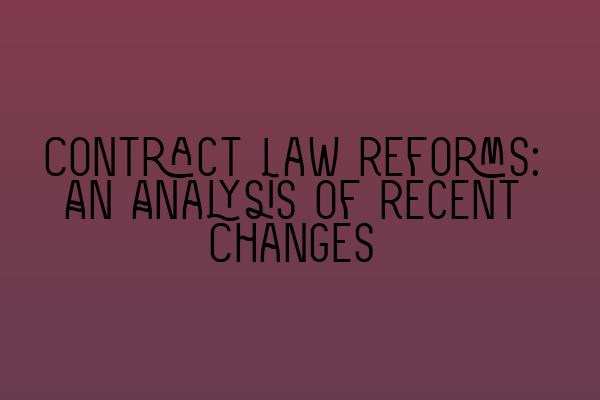Contract Law Reforms: An Analysis of Recent Changes
Welcome to SQE Contract Law, where we provide expert analysis and insights into the ever-evolving landscape of contract law. In this blog post, we will dive deep into the topic of contract law reforms and analyze the recent changes that have taken place. If you’re a legal professional, aspiring solicitor, or someone interested in the legal field, this article is for you.
Contract law is a vital aspect of our legal system, serving as the foundation for transactions, agreements, and business dealings. It provides structure and clarity, allowing parties to establish legally binding relationships and enforceable obligations. However, as society and business practices evolve, so too must contract law.
In recent years, there have been several significant reforms in contract law that aim to modernize and adapt to the changing needs of the legal landscape. These reforms reflect the ongoing efforts to streamline processes, protect the rights of parties involved, and promote fairness and efficiency in the resolution of disputes.
One notable area of reform is the emphasis on electronic signatures and online contracting. With the increasing reliance on digital platforms, it has become essential to recognize and regulate the validity and enforceability of electronic signatures. The Electronic Communications Act 2000 has provided a legal framework for electronic signatures, ensuring their effectiveness and acceptance in contract formation.
The reform surrounding electronic signatures has been crucial in embracing technological advancements and promoting efficiency in contract execution. It has not only simplified the process of entering into contracts but has also expanded opportunities for businesses to operate on a global scale. By eliminating the need for physical presence, parties can now execute contracts remotely, reducing costs and time constraints.
Another significant area of contract law reform involves consumer protection and unfair contract terms. The Consumer Rights Act 2015 has introduced several changes aimed at strengthening the rights of consumers and addressing unfair terms in consumer contracts. The Act requires transparency and clarity in contractual terms, ensuring that consumers are adequately informed and protected from unfair practices.
By enhancing consumer rights and challenging unfair contract terms, these reforms aim to create a more level playing field between businesses and consumers. It encourages fairness, accountability, and responsible business practices, building trust and confidence in commercial transactions.
Furthermore, contract law reforms have also addressed the issue of dispute resolution. Traditional methods of resolving conflicts, such as litigation, can be time-consuming, costly, and adversarial. As a result, alternative dispute resolution (ADR) mechanisms have gained traction as a more efficient and collaborative approach to dispute resolution.
ADR methods, including mediation and arbitration, provide parties with the opportunity to resolve disputes outside of the courtroom. They offer flexibility, confidentiality, and the ability to tailor solutions to meet the specific needs of the parties involved. The Civil Justice Council’s ADR Handbook and the introduction of the Mediation Information and Assessment meeting (MIAM) requirement has further promoted the use of ADR in contract disputes.
By embracing ADR and encouraging its use in contract disputes, these reforms aim to reduce the burden on the court system, facilitate amicable resolutions, and preserve ongoing relationships between parties. It provides an effective and accessible alternative to litigation, promoting efficiency, cost-saving, and long-term stability.
In conclusion, contract law reforms have undergone significant changes in recent years, embracing technological advancements, enhancing consumer protection, and promoting alternative dispute resolution. These reforms reflect the dynamic nature of the legal landscape and the ongoing efforts to adapt to societal and business needs.
At SQE Contract Law, we understand the importance of staying up-to-date with these reforms and staying ahead in the ever-changing legal field. If you’re interested in learning more about related topics, be sure to check out our articles on mentorship for aspiring solicitors, legal challenges and pitfalls, exploring alternative dispute resolution, and the art of contract drafting and negotiation skills.
Stay tuned for more insightful content on contract law reforms and other legal topics. If you have any questions or would like to speak with one of our solicitors, feel free to reach out to us. Remember, knowledge is power, and we are here to empower you in the realm of contract law.
